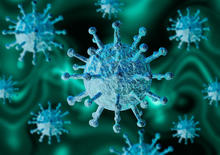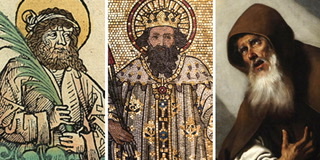
In Advent’s first week, I really want to feel that all is calm, but in the world that revolves around me, things are anything but calm. During this season of Advent — in the first week of Advent 2020 — hearts are not calm at all and nothing feels more appropriate to do than prayer and lament.
13,822,249 Coronavirus cases in this country. 272,525 deaths.
And worldwide, 66,786,028 Coronavirus cases and 1,533,302 deaths.
Lament feels right. Calm does not. Lamenting during this season of waiting is not easy. The Psalmist offers us one of the Penitential psalms, Psalm 130 that begins with a cry to God from a place of deep sorrow, from “out of the depths.” The Psalmist also speaks to us of waiting:
I wait for the Lord, my whole being waits,
and in his word I put my hope.
I wait for the Lord
more than watchmen wait for the morning,
more than watchmen wait for the morning.
— Psalm 130:5-6
I’ve been trying to wait this year, to practice meditation and prayer that emerges “out of the depths” of my soul. How else could it be when I hear the story of five children who lost both parents when Covid ravaged their family? How could I not cry out from the depths when my own family members and friends are suffering with this deadly virus? How could I do anything but Lament as I watch my friends and family suffering the ravages of this virus that has descended upon the world?
My deep prayers and laments, as well as my practice of meditation, has not been going all that well. It’s just too still for me right now, too quiet. Being still makes me impatient to do something. When I stop moving, my mind whirls and all I can think of is all the things I want or need to do.
This voice in my mind is hard to resist, because it seems so reasonable. When I consider the world’s suffering and see it so clearly in my own circle, being still feels like a sin. With the pandemic surging, the injustice we see everywhere, the suffering people who have profound need, how can I justify being calm — still, quiet, resting, breathing, waiting?
Into my place of anxiety and restlessness, the liturgical year invites me into the holy waiting of Advent. Into a culture that places productivity over presence, Advent invites us to believe that we need to be still. Into a culture that tells us if we don’t do it, it won’t get done, Advent asks us to stop working for a season.
Isn’t is an act of humility and trust to stop moving and fixing and tending and meddling, to sit still during Advent? Advent teaches us that there are forces at work beyond our own working, beyond our own dreams of repairing the world. The beautiful reality Advent wants us to know is that even when we stop, God still works. So we really can lay down our tools, set aside our pridefulness, and wait for the morning that God always brings.
In these Advent days, practicing stillness is more important than ever, because in this pandemic winter of 2020, everyone’s most important vocation is to be still and wait — at home and distanced from others. Whether we are essential workers, working from home, unemployed, managing our kids’ education, or some combination of these – we are all being called to be still and wait this winter. We are being asked to wait to hug the people we love. We are waiting for visiting our friends, waiting to eat at our favorite restaurant, waiting to fly to places we want to see, waiting to see the ocean again. We are waiting with hurting hearts to visit our families. We are waiting with aching souls to worship together in our sacred spaces.
Our stillness in this pandemic Advent matters more than it ever has. Yet, we wonder if we can survive it. We wonder if this interminable waiting will eventually make us give up, give in and just go out. Leave our homes. Disregard social distancing. Go visit our best friend in person. Go to church — inside the beautiful sanctuary we so miss — and worship God with loud singing.
In the waiting, in the stillness, how do we find the calm we long for? In the stillness, does God still work in us? We may not be so certain about how to answer those questions, but we do know that this stillness is exactly what will save our neighbors’ lives. This winter, the most important way that we can love our neighbor is to practice stillness.
This winter, we practice Advent as an act of love and an act of hope – hope that this too shall pass. The year 2020 will pass. The pandemic will ease, and we will someday see light emerge from of this dark time. Winter’s cold darkness is not forever. Winter always moves to spring. Night always turns to day. The solitude of Advent always gives way to the Immanuel, God with us of Christmas.
The Psalmist reminds us in poetic verse that the night will pass. “I wait for the Lord,” the poet sings, “more than watchmen wait for the morning, more than watchmen wait for the morning.”
Julian of Norwich might remind us that “All will be well, and all will be well, and every kind of thing will be well.” I am struck again, as always, by these words . “All will be well” is her golden thought. It is a provocative saying, as much in its calming, repetitive sound as in its assurance of a future reality beyond our grasp. In these days, it is a deeply grounding promise in the midst of a chaotic, painful world. Somehow, despite our current experiences, “All will be well, and all will be well, and every kind of thing will be well.”
And yet, all is not well. We have a growing awareness that our current public health crisis will continue in waves, for God knows how long. Schools and businesses will struggle to prepare for the looming unknown. The economic situation is staggering. And the recent murders of black Americans are forcing yet another reckoning with systemic racism in this country. We yearn for calm while we nurse mixed feelings about how we can navigate this troubling time.
Julian would understand these mixed feelings. Julian lived in isolation during a pandemic — the Black Death. The Black Death (also known as the Pestilence, the Great Mortality, or the Plague) was the deadliest pandemic recorded in human history. The Black Death resulted in the deaths of up to 75–200 million people in Eurasia and North Africa, peaking in Europe from 1347 to 1351.
In 1373, at age thirty and so seriously ill she thought she was on her deathbed, Julian received a series of visions or “shewings” of the Passion of Christ. While Julian was struck down with the illness, she experienced the visions, which have been passed down to us as “The Revelations of Divine Love” or the “Showings.” For Julian, her revelation that “all will be well” was not calming or soothing, at least not at first. Instead it shocked her. By her own account, the Showings included the divine words “heavily” and “mournfully” and with “very great fear.” Lament perhaps.
“All will be well?” Her instant response was, essentially, how could this possibly be, given the reality of pain, suffering and human frailty we experience? Or in her words: “Ah, good Lord, how could all things be well, because of the great harm which has come through sin to your creatures?”
According to the final chapter of Showings, she then spent at least 15 years isolated in her cell, immersed in a deep struggle to comprehend the divine meaning of the words that had filled her spirit. Just imagine. Fifteen years contemplating that one line. In other words, she lamented, how can it possibly be that all will be well?
Through love, she concluded — not that fleeting feeling but the divine love itself, a power and an action that beckons and encompasses everything, even the enormity of human suffering. Without context, without the awareness of Julian’s life-long struggle and spiritual quest, her calming words — “All will be well, and all will be well, and every kind of thing will be well.” — becomes mere platitude.
No, all is not calm in these days, at least in the world we can see. But all is calm in the places we cannot see, in our spirit depths and in our longing souls. Advent helps bring holy calm as we wait in the quietude God desires for us. Advent helps us practice stillness. Even when we are lamenting “the sufferings of this present time,” Advent teaches us to trust that the sun is always going to rise, that the night never goes on forever, that into dark, long periods of history — God comes. Every time.
On the starry, silent night we wait for, all is calm.






 This pandemic has taken a toll on so many Americans. Mothers are struggling with children being at home, some having to learn on the fly how to home school them. Families grieve the loss of loved ones who died from the virus. Older adults fear their increased vulnerability and their body’s inability to fight the virus. Immunosuppressed persons like I am are terrified to leave home and are incessantly washing their hands, wearing masks and using hand sanitizer. Many people have lost their jobs while businesses all over the country have shut their doors. Churches have suspended worship services and other gatherings indefinitely. That is merely a tiny snapshot of the human toll the coronavirus is taking.
This pandemic has taken a toll on so many Americans. Mothers are struggling with children being at home, some having to learn on the fly how to home school them. Families grieve the loss of loved ones who died from the virus. Older adults fear their increased vulnerability and their body’s inability to fight the virus. Immunosuppressed persons like I am are terrified to leave home and are incessantly washing their hands, wearing masks and using hand sanitizer. Many people have lost their jobs while businesses all over the country have shut their doors. Churches have suspended worship services and other gatherings indefinitely. That is merely a tiny snapshot of the human toll the coronavirus is taking.
